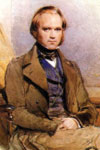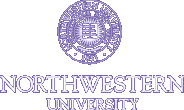About Darwin

Charles Robert Darwin was born the fifth of six children of a prosperous physician on February 12, 1809 in Shrewsbury, Shropshire, England. His entire family was wealthy and intellectually prominent: His paternal grandfather Erasmus was a famous physician, poet, scientist, and inventor, and his maternal grandfather was Josiah Wedgwood, founder of artistically and technically pioneering Wedgwood Pottery.
After attending the Shrewsbury School, Darwin and his older brother Erasmus both entered medical school at Edinburgh in 1825. Medical school seemed natural for the son and grandson of famous physicians. The sight of “two very bad operations, one on a child,” though, appalled Charles. Repulsed by medicine as practiced “before the blessed days of chloroform” and without financial need to pursue it as a career, he turned back to his love of natural history.
Charles’s father, adamant that he not turn into "an idle sporting man," sent him to Cambridge to prepare for the ministry. Charles read and admired William Paley’s Natural Theology (his later rejection of Paley's views demolished their credibility), and was enthusiastic about visiting the tropics after reading the German explorer, Alexander von Humboldt's, travel narratives. Most importantly, Charles studied botany and geology with John Henslow, who served as his mentor, and it was Henslow who proposed Charles as naturalist for the Beagle expedition. His uncle Josiah had to persuade Charles’s father to let him go, and on January 7, 1832, the Beagle, commanded by Robert FitzRoy, set sail on a surveying voyage to South America and around the world, with Charles on board.
During the nearly five year voyage Darwin devised and tested original ideas on the development of coral reefs, collected valuable specimens to be analyzed by other scholars, gained exposure to life in widely differing conditions, kept a journal (that would later make him famous), and accumulated ideas that served as the basis for his insights into evolution and natural selection. Darwin developed those ideas over a long period, collecting data with the help of a world-wide network of correspondents, but even after his ideas gelled he delayed publishing his book as he collected added documentation – and hesitated to bring his ideas to the public. In June of 1858 he received a letter from Alfred Russel Wallace asking him to review the manuscript "On the tendency of varieties to depart indefinitely from the original type." Wallace’s ideas were in many respects identical to Darwin’s own -- Darwin’s delay might have cost him priority as the original discoverer, but his friends helped to have his results presented together with Wallace's at a scientific symposium. They then persuaded Darwin to publish a larger abstract of his book, and accordingly Darwin set to work on what would become On the Origin of Species by Means of Natural Selection, or the Preservation of Favored Races in the Struggle for Life, published October 1859.
Darwin’s poor health, and his tendency to avoid public disputes, prevented him from participating in public presentations of his ideas; he was not even present at the meeting where his ideas were first publicly described. Many friends, including Thomas Henry Huxley (known as "Darwin’s bulldog") served to spread natural selection as evidence of evolution. Darwin continued to make other important scientific contributions, but chiefly remained at his home, Down House, in Kent. He died a world-renowned and respected scientist on April 19, 1882.
By Robert Michaelson, Head Librarian
Seeley G. Mudd Library for Science and Engineering
Northwestern University
